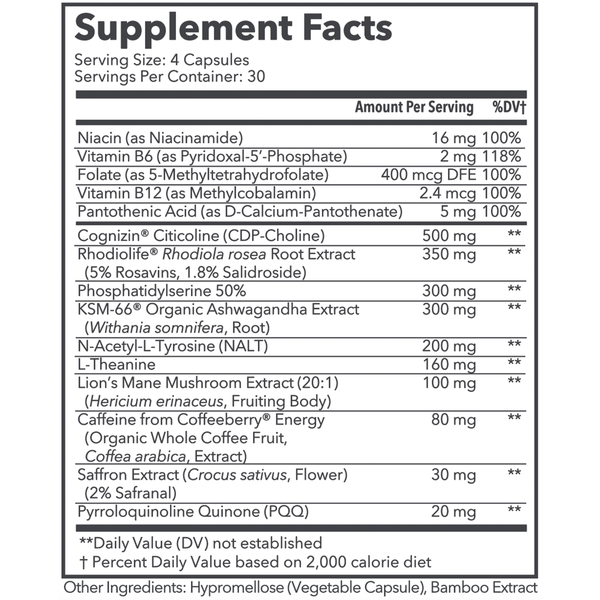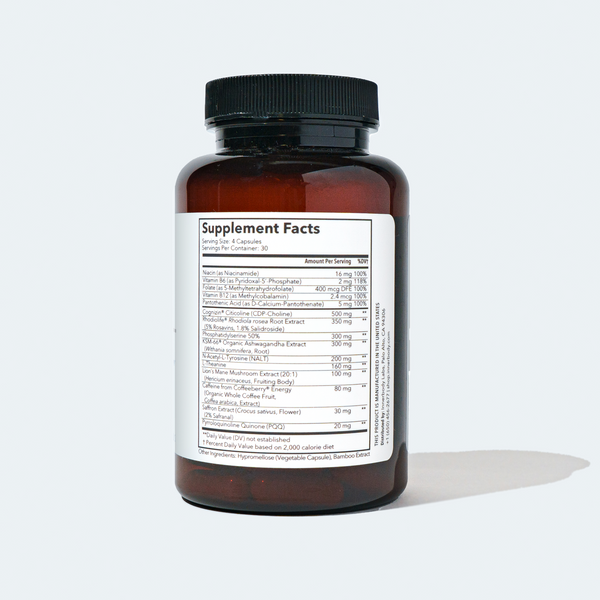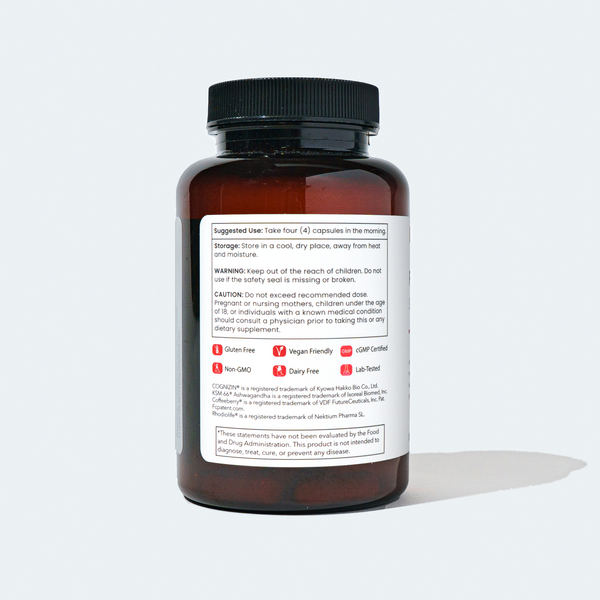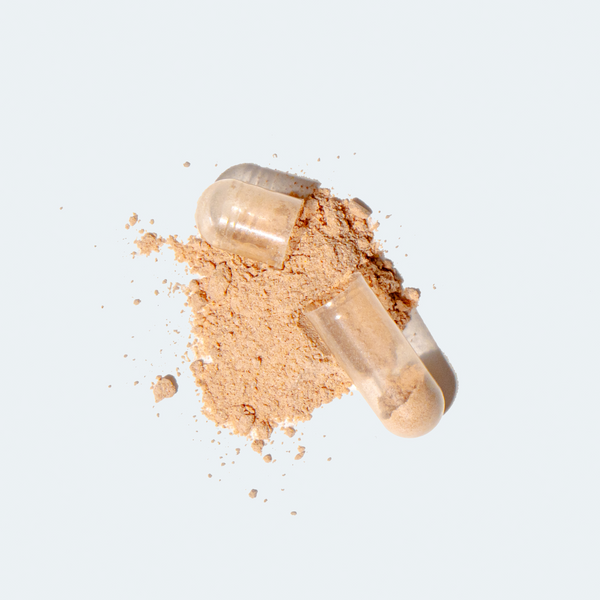What Is an “Adaptogen”, Anyway?
From ancient roots to modern supplements, here’s everything you need to know.

The short answer: adaptogens are plants and fungi studied for their ability to help the body adapt to stress. That might mean easing tension, supporting energy, or promoting better sleep. The idea isn’t new; traditional systems of medicine have used herbs like ashwagandha and ginseng for centuries. What’s changed is that modern science has begun to explore how they work and when they might help.
So, are adaptogens just hype, or is there real evidence behind them? Let’s take a closer look.
What is an adaptogen?
At its core, an adaptogen is a natural substance — often an herb, root, or mushroom — that helps the body adapt to stress. In Ayurveda, India’s traditional system of medicine that emphasizes balance in mind and body, ashwagandha was prescribed to restore strength and resilience.[1] In Traditional Chinese Medicine, ginseng and schisandra were considered qi-tonics — herbs that protect vitality and balance energy.[2]
The actual term adaptogen came much later. In the mid-20th century, Soviet researchers observed that certain botanicals seemed to improve resistance to physical, chemical, and emotional stress without throwing normal body function out of balance.[3] Later, the European Medicines Agency summarized these “classical criteria” in three points.[4]
-
Non-specific action: They should increase the body’s resistance to a broad range of stressors.
-
Normalizing effect: They should restore balance, calming what’s overactive or boosting what’s depleted.
- Safety: They should be non-toxic and suitable for long-term use at normal doses.
Over the years, researchers have studied dozens of candidates, but a handful of herbs, mushrooms, and roots consistently stand out for their clinical evidence and historical use.
-
Ashwagandha (Withania somnifera): A cornerstone of Ayurveda, with clinical trials showing benefits for stress, sleep quality, and testosterone support.[5] [6] [7]
-
Rhodiola rosea: A flowering herb from cold, high-altitude regions, linked to reduced fatigue, sharper focus, and better mood in meta-analyses and human trials.[8] [9] [10]
-
Panax ginseng: A staple of Traditional Chinese Medicine, ginseng is being studied for effects on cognition, energy, and immune resilience.[11] [12] [13]
-
Tongkat ali (Eurycoma longifolia): Also known as longjack, tongkat ali is often grouped with adaptogens for its ability to modulate cortisol and support testosterone in men.[14]
-
Reishi mushroom (Ganoderma lucidum): A traditional “longevity mushroom” in Chinese medicine, with emerging human research suggesting benefits for fatigue, mood, and immune balance.[50]
-
Maca (Lepidium meyenii): A root from the Andes traditionally used to enhance stamina and fertility, and increasingly described as an adaptogen. Clinical studies suggest benefits for mood, energy, and sexual function.[51]
-
Saffron (Crocus sativus): A spice long valued in Persian and Mediterranean traditions, with modern clinical trials linking saffron to improved mood, reduced anxiety, and better sleep quality.[35] [53]
- Others: Holy basil, schisandra berries, lemon balm, and eleuthero are also common adaptogens, though the strength of evidence varies.[2] [15] [16] [17] [37]
It’s worth noting that the term adaptogen itself is somewhat controversial. Some scientists argue it’s too broad, preferring to study each plant or mushroom on its own merits.[4] Still, many of the herbs, roots, and fungi most often labeled as adaptogens — including ashwagandha, maca, and reishi — have been studied in dozens of clinical trials, and systematic reviews support their role in stress resilience, sleep quality, and mood.[3] [50] [51]
How do adaptogens work?
Adaptogens don’t work like a caffeine jolt or a sedative. Instead, they act more like stress modulators — nudging the body’s systems back toward balance when stress pulls them off center.
It’s believed this happens through several overlapping mechanisms:
-
Regulating the stress response. Some adaptogens influence the hypothalamic-pituitary-adrenal (HPA) axis, the core pathway that controls cortisol and other stress hormones.[1] [3] Reviews suggest they help normalize hormone levels, lowering excessive cortisol while preventing underactive responses.[2]
-
Supporting cellular defenses. Other evidence — mostly from cell and animal studies — suggests that some adaptogens can increase production of “molecular chaperones,” proteins that help cells cope with stress and protect against damage.[1] [3]
-
Extending resistance. Stress normally pushes the body through three stages: alarm, resistance, and exhaustion. Some researchers propose that adaptogens may lengthen the “resistance” phase, helping you stay longer in the adaptive, high-functioning state before fatigue sets in.[3]
-
Plant compounds at work. Reviews point to specific phytochemicals — like ginsenosides in ginseng, withanolides in ashwagandha, and rosavins in rhodiola — that may underlie these stress-buffering effects.[18]
In short, adaptogens appear to work not by forcing one outcome but by helping the body adapt more flexibly to stress — whether that means calming the mind, restoring energy, or improving resilience over time.[1] [2] [3]
Benefits of adaptogens
Adaptogens aren’t cure-alls, but clinical trials and systematic reviews show they can support several important areas of health. The effects depend on the specific herb, the dose, and the population studied.
Stress and fatigue relief
Among the most consistent findings are reductions in stress and fatigue.[18] Meta-analyses of rhodiola trials show improvements in energy, resilience, and overall well-being, especially under physical or mental stress.[10] [19] Ashwagandha has also been linked to lower perceived stress and reduced cortisol in randomized studies.[5]
Sleep and mood
Ashwagandha extracts have been shown to improve sleep quality and reduce anxiety in adults with insomnia or high stress.[6] Rhodiola has also demonstrated modest benefits for symptoms of depression and anxiety in pooled analyses.[19]
Energy and performance
Rhodiola in particular has been studied for endurance. A recent meta-analysis found that supplementation may enhance physical performance by reducing perceived exertion and delaying fatigue.[20]
Ginseng, another long-standing adaptogen in Traditional Chinese Medicine, has also been investigated for its potential to improve energy and stamina. However, a 2016 meta-analysis noted that few trials met strict reliability standards, so more high-quality studies are needed before drawing firm conclusions.[21]
Hormone support
Ashwagandha supplementation has been shown to increase testosterone and improve strength in resistance-trained men.[22] Tongkat ali, another botanical often considered an adaptogen, has demonstrated similar effects, with trials reporting increases in testosterone, improved mood, and reduced cortisol.[14]
Cognitive support
Some adaptogens show promise for supporting brain health. Rhodiola has been linked to improved focus and reduced mental fatigue in stressful settings.[8] [9] [10] Ashwagandha has also demonstrated cognitive benefits in clinical trials, with improvements in memory, attention, and executive function among adults under chronic stress.[23]
Are adaptogens safe?
For most healthy adults, adaptogens appear to be safe when used at typical supplemental doses. In fact, one of the criteria for an herb to qualify as an adaptogen is that it must be “non-toxic when taken in normal doses.”[24]
A 2023 systematic review and meta-analysis of 25 studies on nine different adaptogens — including ashwagandha, rhodiola, ginseng, holy basil, bacopa, and tongkat ali — concluded that they can generally be considered safe.[25] Most trials reported no serious side effects, with only occasional reports of mild issues like digestive upset, headaches, or dizziness. Earlier reviews also noted that adaptogens such as eleuthero, rhodiola, and schisandra were safe in short-term toxicity studies, and some data even suggest rhodiola may have anti-toxic activity.[3]
Still, even safe herbs can cause problems in certain situations:
-
Pregnancy and nursing: There’s not enough reliable research on adaptogen safety in these groups, and some evidence suggests caution.[26] [27] It’s best to avoid adaptogens unless under medical supervision.
-
Children and adolescents: Adaptogens haven’t been adequately studied in people under 18, and doses used in adult products may be too high for younger bodies.[28]
-
Medication interactions: Adaptogens can interact with a wide range of drugs, including antidiabetic medications, thyroid hormones, anticoagulants, blood pressure drugs, and sedatives.[25] One review found they were involved in 9% of adverse events when combined with antidepressants and other preparations — rare, but worth noting.[29]
- Medical conditions: Certain adaptogens may complicate existing conditions. For example, ginseng can affect blood sugar and clotting, and ashwagandha may be unsuitable for people with thyroid issues.[27] [30]
In summary: adaptogens are generally well tolerated, but “generally safe” doesn’t mean “safe for everyone.” If you’re pregnant, nursing, under 18, living with a chronic health condition, or taking prescription medications, it’s best to check with your healthcare provider before using adaptogen supplements.
Getting started with adaptogens
If you’re interested in trying adaptogens, the key is to focus on those with the strongest evidence — herbs like ashwagandha, rhodiola, tongkat ali, and saffron, which have been studied in dozens of clinical trials. At Innerbody Labs, several of our formulas feature these well-researched adaptogens alongside complementary nutrients to maximize effectiveness.
Here’s how you can start using them in your own routine:
Focus Support
Stress and mental fatigue are two of the most common reasons people turn to adaptogens, and that’s where Focus Support shines. The formula combines four of the best-studied adaptogens: rhodiola, known for boosting resilience and cognitive performance under stress; ashwagandha, which reduces anxiety and supports memory and focus; and saffron and lion’s mane, both linked to improved mood and cognitive health in clinical research.[8] [9] [10] [23] [35] [52] Together, these adaptogens help modulate the stress response and protect against burnout.
It’s further supported by:
-
Cognizin citicoline (500mg) for sharper focus.[31]
-
Phosphatidylserine (300mg) and N-acetyl L-tyrosine (200mg) to support memory and neurotransmitter balance.[32] [33]
-
L-theanine (160mg) to promote steady mood and calm focus.[34]
- Caffeine from Coffeeberry (80mg), which delivers smooth energy without the jitters when combined with L-theanine.[34]
This careful balance of adaptogens, nootropics, and nutrients helps you stay energized and clear-headed throughout the day.
Sleep Support
Sleep is one of the first things stress can steal from you, which is why Sleep Support combines clinically studied adaptogens with calming botanicals and nutrients to restore healthy rest without leaving you groggy in the morning. At its core are the adaptogens ashwagandha, Relissa lemon balm, and saffron — each supported by clinical research for improving sleep quality and reducing stress.[6] [35] [36] [37]
We pair it with:
-
Lactium casein hydrolysate (300mg), shown to shorten sleep onset and reduce nighttime waking.[38]
-
L-theanine (200mg), which supports relaxation at the same dose used in successful human trials.[39]
- Magnesium bisglycinate (127mg elemental), providing the same dose found effective in sleep studies.[40]
By combining adaptogens with evidence-based nutrients at clinically relevant doses, Sleep Support addresses stress, sleep latency, and overall sleep quality — without relying on sedatives. The result is a comprehensive formula designed to help you fall asleep faster, stay asleep longer, and wake up restored.
Testosterone Support
Low testosterone can impact energy, strength, mood, and sexual health.[49] That’s why Testosterone Support combines clinically studied adaptogens with key vitamins, minerals, and supportive compounds to restore hormonal balance and vitality. The foundation of the formula is a trio of adaptogens — ashwagandha, maca extract, and tongkat ali — each supported by human studies for benefits to testosterone, stress resilience, and male sexual wellness.[5] [14] [41] [43]
Alongside these adaptogens, we add:
-
Fenugreek (600mg), shown in clinical trials to significantly increase free testosterone.[42]
-
Vitamin D (1,000IU) and zinc (25mg), both linked to healthy testosterone levels in men, paired with copper and vitamin K2 to balance safety and absorption.[44] [45] [46] [47]
- Selenium (20mcg), tied to male fertility and sperm health in human studies.[48]
By combining adaptogens like ashwagandha, maca, and tongkat ali with proven testosterone-supportive nutrients, Testosterone Support addresses stress, hormone balance, and sexual vitality from multiple angles. The result is a formula designed to help men rebuild energy, strength, and confidence naturally.
From ancient roots to modern results
Adaptogens bridge centuries of practice and decades of research. Ayurveda and Traditional Chinese Medicine have long used herbs like ashwagandha, rhodiola, and ginseng to restore balance.[1] [2] Modern science later confirmed that they can modulate stress pathways such as the HPA axis and support resilience against fatigue, poor sleep, and hormonal imbalance.[3] [4] Unlike stimulants or sedatives, adaptogens normalize function — easing cortisol when stress runs high or supporting energy when it runs low.[18] [20] Safety reviews consistently find that standard doses are well tolerated, with only mild side effects reported.[24] [25]
If you’re ready to explore adaptogens, Innerbody Labs provides a straightforward way to begin — evidence-based blends designed for sleep, focus, and hormone health.
Sources
-
Panossian, A. G., Efferth, T., Shikov, A. N., Pozharitskaya, O. N., Kuchta, K., Mukherjee, P. K., Banerjee, S., Heinrich, M., Wu, W., Guo, D.-A., & Wagner, H. (2020). Evolution of the adaptogenic concept from traditional use to medical systems: pharmacology of stress- and aging-related diseases. Medicinal Research Reviews, 41(1), 630–703.
-
Liao, L.-Y., He, Y.-F., Li, L., Meng, H., Dong, Y.-M., Yi, F., & Xiao, P.-G. (2018). A preliminary review of studies on adaptogens: comparison of their bioactivity in TCM with that of ginseng-like herbs used worldwide. Chinese Medicine, 13, 57.
-
Panossian, A., & Wikman, G. (2010). Effects of adaptogens on the central nervous system and the molecular mechanisms associated with their stress—protective activity. Pharmaceuticals (Basel), 3(1), 188–224.
-
European Medicines Agency. (2008, May 8). OVERVIEW OF COMMENTS ON ‘REFLECTION PAPER ON ADAPTOGENIC CONCEPT’. European Medicines Agency.
-
Salve, J., Pate, S., Debnath, K., & Langade, D. (2019). Adaptogenic and anxiolytic effects of Ashwagandha root extract in healthy adults: a double-blind, randomized, placebo-controlled clinical study. Cureus, 11(12), e6466.
-
Cheah, K. L., Norhayati, M. N., Yaacob, L. H., & Rahman, R. A. (2021). Effect of Ashwagandha (Withania somnifera) extract on sleep: a systematic review and meta-analysis. PLoS ONE, 16(9), e0257843.
-
Chauhan, S., Srivastava, M. K., & Pathak, A. K. (2022). Effect of standardized root extract of ashwagandha (Withania somnifera) on well-being and sexual performance in adult males: a randomized controlled trial. Health Science Reports, 5(4), e741.
-
Darbinyan, V., Kteyan, A., Panossian, A., Gabrielian, E., Wikman, G., & Wagner, H. (2000). Rhodiola rosea in stress induced fatigue--a double blind cross-over study of a standardized extract SHR-5 with a repeated low-dose regimen on the mental performance of healthy physicians during night duty. Phytomedicine : International Journal of Phytotherapy and Phytopharmacology, 7(5), 365–371.
-
Darbinyan, V., Aslanyan, G., Amroyan, E., Gabrielyan, E., Malmström, C., & Panossian, A. (2007). Clinical trial of Rhodiola rosea L. extract SHR-5 in the treatment of mild to moderate depression. Nordic Journal of Psychiatry, 61(5), 343–348.
-
Tinsley, G. M., Jagim, A. R., Potter, G. D. M., Garner, D., & Galpin, A. J. (2024). Rhodiola rosea as an adaptogen to enhance exercise performance: a review of the literature. The British Journal of Nutrition, 131(3), 461–473.
-
Baek, J. H., Heo, J., Fava, M., Mischoulon, D., Choi, K. W., Na, E. J., Cho, H., & Jeon, H. J. (2019). Effect of Korean Red Ginseng in individuals exposed to high stress levels: A 6-week, double-blind, randomized, placebo-controlled trial. Journal of Ginseng Research, 43(3), 402-407.
-
Bell, L., Whyte, A., Duysburgh, C., Marzorati, M., Cozannet, R. L., Fança-Berthon, P., Fromentin, E., & Williams, C. (2021). A randomized, placebo-controlled trial investigating the acute and chronic benefits of American Ginseng (Cereboost®) on mood and cognition in healthy young adults, including in vitro investigation of gut microbiota changes as a possible mechanism of action. European Journal of Nutrition, 61(1), 413.
-
Arring, N. M., Millstine, D., Marks, L. A., & Nail, L. M. (2018). Ginseng as a treatment for fatigue: a systematic review. The Journal of Alternative and Complementary Medicine, 24(7), 624–633.
-
Kotirum, S., Ismail, S. B., & Chaiyakunapruk, N. (2015). Efficacy of Tongkat Ali (Eurycoma longifolia) on erectile function improvement: Systematic review and meta-analysis of randomized controlled trials. Complementary Therapies in Medicine, 23(5), 693-698.
-
Jamshidi, N., & Cohen, M. M. (2017). The clinical efficacy and safety of Tulsi in humans: a systematic review of the literature. Evidence-Based Complementary and Alternative Medicine, 2017, 9217567.
-
Nowak, A., Zakłos-Szyda, M., Błasiak, J., Nowak, A., Zhang, Z., & Zhang, B. (2019). Potential of Schisandra chinensis (Turcz.) Baill. in human health and nutrition: a review of current knowledge and therapeutic perspectives. Nutrients, 11(2), 333.
-
Esmaealzadeh, N., Iranpanah, A., Sarris, J., & Rahimi, R. (2022). A literature review of the studies concerning selected plant-derived adaptogens and their general function in body with a focus on animal studies. Phytomedicine, 105, 154354.
-
Todorova, V., Ivanov, K., Delattre, C., Nalbantova, V., Karcheva-Bahchevanska, D., & Ivanova, S. (2021). Plant adaptogens—history and future perspectives. Nutrients, 13(8), 2861.
-
Stojcheva, E. I., & Quintela, J. C. (2022). The effectiveness of Rhodiola rosea L. preparations in alleviating various aspects of life-stress symptoms and stress-induced conditions—encouraging clinical evidence. Molecules, 27(12), 3902.
-
Wang, X., Yang, X., Gao, Z., Zeng, J., & Liu, Y. (2025). The effect of Rhodiola rosea supplementation on endurance performance and related biomarkers: a systematic review and meta-analysis. Frontiers in Nutrition, 12, 1645346.
-
Bach, H. V., Kim, J., Myung, S. K., & Cho, Y. A. (2016). Efficacy of Ginseng supplements on fatigue and physical performance: a meta-analysis. Journal of Korean Medical Science, 31(12), 1879–1886.
-
Ziegenfuss, T. N., Kedia, A. W., Sandrock, J. E., Raub, B. J., Kerksick, C. M., & Lopez, H. L. (2018). Effects of an Aqueous Extract of Withania somnifera on Strength Training Adaptations and Recovery: The STAR Trial. Nutrients, 10(11), 1807.
-
Gopukumar, K., Thanawala, S., Somepalli, V., Rao, T. S. S., Thamatam, V. B., & Chauhan, S. (2021). Efficacy and safety of Ashwagandha root extract on cognitive functions in healthy, stressed adults: a randomized, double-blind, placebo-controlled study. Evidence-Based Complementary and Alternative Medicine, 2021, 8254344.
-
Cleveland Clinic. (2022). Adaptogens. Cleveland Clinic.
-
Tóth-Mészáros, A., Garmaa, G., Hegyi, P., Bánvölgyi, A., Fenyves, B., Fehérvári, P., Harnos, A., Gergő, D., Nguyen Do To, U., & Csupor, D. (2023). The effect of adaptogenic plants on stress: A systematic review and meta-analysis. Journal of Functional Foods, 108, 105695.
-
National Center for Complementary and Integrative Health. (2025, April). Rhodiola. National Institutes of Health.
-
Office of Dietary Supplements, National Institutes of Health. (2025, May 2). Ashwagandha: Is it helpful for stress, anxiety, or sleep? Fact Sheet for Health Professionals. National Institutes of Health.
-
Exon Publications (2025). Adaptogens: Examples, Supplements, Drops, Health Benefits, and Side Effects. Exon Publications (Brisbane, Australia).
-
Siwek, M., Woroń, J., Wrzosek, A., Gupało, J., & Chrobak, A. A. (2023). Harder, better, faster, stronger? Retrospective chart review of adverse events of interactions between adaptogens and antidepressant drugs. Frontiers in Pharmacology, 14, 1271776.
-
Chen, W., Balan, P., & Popovich, D. G. (2019). Review of Ginseng anti-diabetic studies. Molecules, 24(24), 4501.
-
Nakazaki, E., Mah, E., Sanoshy, K., Citrolo, D., & Watanabe, F. (2021). Citicoline and Memory Function in Healthy Older Adults: A Randomized, Double-Blind, Placebo-Controlled Clinical Trial. The Journal of Nutrition, 151(8), 2153.
-
Kato-Kataoka, A., Sakai, M., Ebina, R., Nonaka, C., Asano, T., & Miyamori, T. (2010). Soybean-Derived Phosphatidylserine Improves Memory Function of the Elderly Japanese Subjects with Memory Complaints. Journal of Clinical Biochemistry and Nutrition, 47(3), 246.
-
Steenbergen, L., Sellaro, R., Hommel, B., & Colzato, L. S. (2015). Tyrosine promotes cognitive flexibility: Evidence from proactive vs. Reactive control during task switching performance. Neuropsychologia, 69, 50-55.
-
Haskell, C. F., Kennedy, D. O., Milne, A. L., Wesnes, K. A., & Scholey, A. B. (2008). The effects of l-theanine, caffeine and their combination on cognition and mood. Biological Psychology, 77(2), 113-122.
-
Kell, G., Rao, A., Beccaria, G., Clayton, P., Inarejos-García, A. M., & Prodanov, M. (2017). affron® a novel saffron extract (Crocus sativus L.) improves mood in healthy adults over 4 weeks in a double-blind, parallel, randomized, placebo-controlled clinical trial. Complementary Therapies in Medicine, 33, 58–64.
-
Deshpande, A., Irani, N., Balkrishnan, R., & Benny, I. R. (2020). A randomized, double blind, placebo controlled study to evaluate the effects of ashwagandha (Withania somnifera) extract on sleep quality in healthy adults. Sleep Medicine, 72, 28–36.
-
Mathews, I. M., Eastwood, J., Lamport, D. J., Cozannet, R. L., Fanca-Berthon, P., & Williams, C. M. (2024). Clinical efficacy and tolerability of lemon balm (Melissa officinalis L.) in psychological well-being: A review. Nutrients, 16(20), 3545.
-
Kim, H. J., Kim, J., Lee, S., Kim, B., Kwon, E., Lee, J. E., Chun, M. Y., Lee, C. Y., Boulier, A., Oh, S., & Lee, H. W. (2019). A double-blind, randomized, placebo-controlled crossover clinical study of the effects of alpha-s1 casein hydrolysate on sleep disturbance. Nutrients, 11(7), 1466.
-
Bulman, A., Marx, W., Turner, M., McKune, A., & Naumovski, N. (2023). The effects of l-theanine supplementation on quality of sleep: A systematic review. Proceedings, 91(1), 32.
-
Rawji, A., Peltier, M. R., Mourtzanakis, K., Awan, S., Rana, J., Pothen, N. J., & Afzal, S. (2024). Examining the effects of supplemental magnesium on self-reported anxiety and sleep quality: A systematic review. Cureus, 16(4), e59317.
-
Verma, N., Gupta, S. K., Tiwari, S., Mishra, A. K., Thakare, V., & Patil, S. (2023). Effect of Ashwagandha Root Extract on Serum Testosterone and Muscle Recovery in Strength Training. International Journal of Medical and Pharmaceutical Research, 4(5), 371-381.
-
Wankhede, S., Mohan, V., & Thakurdesai, P. (2016). Beneficial effects of fenugreek glycoside supplementation in male subjects during resistance training: A randomized controlled pilot study. Journal of Sport and Health Science, 5(2), 176-182.
-
Gonzales, G. F., Córdova, A., Vega, K., Chung, A., Villena, A., Góñez, C., & Castillo, S. (2002). Effect of Lepidium meyenii (MACA) on sexual desire and its absent relationship with serum testosterone levels in adult healthy men. Andrologia, 34(6), 367–372.
-
Pilz, S., Frisch, S., Koertke, H., Kuhn, J., Dreier, J., Obermayer-Pietsch, B., Wehr, E., & Zittermann, A. (2011). Effect of vitamin D supplementation on testosterone levels in men. Hormone and Metabolic Research, 43(3), 223–225.
-
Hunt, C. D., Johnson, P. E., Herbel, J., & Mullen, L. K. (1992). Effects of dietary zinc depletion on seminal volume and zinc loss, serum testosterone concentrations, and sperm morphology in young men. The American journal of clinical nutrition, 56(1), 148–157.
-
Duncan, A., Yacoubian, C., Watson, N., & Morrison, I. (2015). The risk of copper deficiency in patients prescribed zinc supplements. Journal of Clinical Pathology, 68(9), 723–725.
-
Masterjohn, C. (2007). Vitamin D toxicity redefined: Vitamin K and the molecular mechanism. Medical Hypotheses, 68(5), 1026-1034.
-
Oluboyo, A. O., Adijeh, R. U., Onyenekwe, C. C., Oluboyo, B. O., Mbaeri, T. C., Odiegwu, C. N., Chukwuma, G. O., & Onwuasoanya, U. F. (2012). Relationship between serum levels of testosterone, zinc and selenium in infertile males attending fertility clinic in Nnewi, south east Nigeria. African Journal of Medicine and Medical Sciences, 41 Suppl, 51–54.
-
Qaseem, A., Horwitch, C.A., Vijan, S., Etxeandia-Ikobaltzeta, I., & Kansagara, D., for the Clinical Guidelines Committee of the American College of Physicians. (2020). Testosterone treatment in adult men with age-related low testosterone: a clinical guideline from the American College of Physicians. Annals of Internal Medicine, 172, 126-133.
-
Wu, S., Zhang, S., Peng, B., Tan, D., Wu, M., Wei, J., Wang, Y., & Luo, H. (2024). Ganoderma lucidum: a comprehensive review of phytochemistry, efficacy, safety and clinical study. Food Science and Human Wellness, 13(2), 568–596.
-
Ulloa del Carpio, N., Alvarado-Corella, D., Quiñones-Laveriano, D. M., Araya-Sibaja, A., Vega-Baudrit, J., Monagas-Juan, M., Navarro-Hoyos, M., & Villar-López, M. (2024). Exploring the chemical and pharmacological variability of Lepidium meyenii: a comprehensive review of the effects of maca. Frontiers in Pharmacology, 15, 1360422.
-
Vigna, L., Morelli, F., Agnelli, G. M., Napolitano, F., Ratto, D., Occhinegro, A., Iorio, C. D., Savino, E., Girometta, C., Brandalise, F., & Rossi, P. (2019). Hericium erinaceus Improves Mood and Sleep Disorders in Patients Affected by Overweight or Obesity: Could Circulating Pro-BDNF and BDNF Be Potential Biomarkers? Evidence-Based Complementary and Alternative Medicine : ECAM, 2019, 7861297.
- Anaeigoudari, F., Anaeigoudari, A., & Kheirkhah-Vakilabad, A. (2023). A review of therapeutic impacts of saffron (Crocus sativus L.) and its constituents. Physiological Reports, 11(15), e15785.





28 Reviews
Focus Support
$115.00
